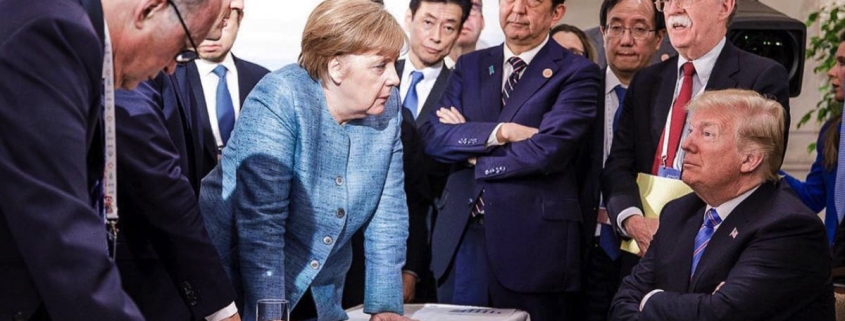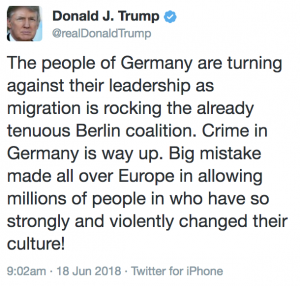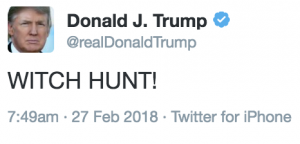Nelson Cunningham, who has far better legal qualifications than I do but who, as far as I’ve seen, has written very little on the Mueller investigation has taken Politico’s very good reporting on a second appeal involving the Mueller inquiry and started a parlor game among people convinced this means Trump got a subpoena. Jay Sekulow has already denied the report.
Cunningham bases his argument on the following observations, along with the observation that the initial court filings came the day after Rudy Giuliani announced he had completed writing a challenge to an as yet unserved subpoena:
- The parties and the judges have moved with unusual alacrity. Parties normally have 30 days to appeal a lower court action. The witness here appealed just five days after losing in the district court – and three days later filed a motion before the appellate court to stay the district court’s order. That’s fast.
- The appeals court itself responded with remarkable speed, too. One day after getting the witness’s motion, the court gave the special counsel just three days to respond – blindingly short as appellate proceedings go. The special counsel’s papers were filed October 1.
- At this point an unspecified procedural flaw seems to have emerged, and on October 3, the appeals court dismissed the appeal. Just two days later, the lower court judge cured the flaw, the witness re-appealed, and by October 10 the witness was once again before appellate court. Thanks to very quick action of all the judges, less than one week was lost due to a flaw that, in other cases, could have taken weeks or months to resolve.
- Back before the D.C. Circuit, this case’s very special handling continued. On October 10, the day the case returned to the court, the parties filed a motion for expedited handling, and within two days, the judges had granted their motion and set an accelerated briefing schedule. The witness was given just 11 days to file briefs; the special counsel (presumably) just two weeks to respond; and reply papers one week later, on November 14 (for those paying attention, that’s 8 days after the midterm elections). Oral arguments are set for December 14.
I suspect the subpoena — if that’s what this is — is either for a White House figure (John Kelly or Don McGahn might be possibilities), a lawyer (Trump Organization lawyers Alan Garten and Alan Futerfas both had non-privileged conversations about the pushback on the June 9 meeting, as did Agalarov lawyer Scott Balber), or a journalist (Chuck Johnson and Lee Stranahan have denied having been contacted by Mueller; Hannity would be another possibility).
I’ve laid out the underlying timeline, below. There are three dockets involved in the mystery challenge: 18-gj-41-BAH, which is sealed, and 18-3068 and 18-3071 before the DC Circuit. For point of comparison, I’ve included Andrew Miller’s appeal of a grand jury subpoena in the timeline (which Cunningham doesn’t mention at all), in italics, as well; those docket numbers are 18-gj-34-BAH and 18-3052. I’ve also included some key public reports that Cunningham doesn’t mention that provide key context.
Miller’s docket easily disproves one of Cunningham’s arguments: that the appeal itself was very quick. Miller, like the mystery challenger, both filed their appeal within days (suggesting that timing came from Beryl Howell, not the appellants). With Miller, there was a pause to litigate the issue of Concord Management’s status, but that pause was litigated on the same accelerated schedule as the jurisdictional issue for the mystery appellant. With the mystery appellant, there appeared to be some slam dunk procedural issue for why the Circuit did not yet have jurisdiction. It was suggested to me that the mystery person may not have taken the legal step of being held in contempt before appealing, as Miller did, which would explain the quick jurisdictional response for the mystery challenger.
Miller’s docket also shows that the results of motion to expedite aren’t that dramatic. With no expedited schedule, Miller’s initial schedule (including the Concord litigation) provided him 24 days for his opening brief, gave Mueller 16 days to respond, and Miller 5 days to reply, with 41 days for the Circuit to consider the appeal or a total of 85 days after the filing. As Cunningham notes, the mystery appellant got just 11 days to file the initial brief, Mueller got two weeks to respond, and the mystery appellant got 7 days to reply. The Circuit gave themselves a month to consider the appeal, or a total of 65 days from second appeal. But that works out to be 81 days from the initial September 24 appeal, about the same amount of time as Miller’s appeal. The expedited time here mostly came out of the appellant’s time for the initial brief and the Circuit consideration (which might be a fair outcome given the appeal without jurisdiction); Mueller’s schedule remains roughly similar. It has been suggested that the mystery appellant’s decision to appeal in spite of that procedural flaw may have provided more urgency for the appeal (for example, if Howell had not stayed contempt for the mystery appellant, then the risk of jailing would be greater than it would be for Miller, for whom she stayed the contempt).
Finally, Cunningham doesn’t consider something else in the public record. On October 11, right in the middle of this litigation, CNN revealed that Mueller had given Trump — and Trump was working on — a set of questions pertaining to conspiracy. The other day, Bloomberg reported that Trump had finished answers to that question, but was withholding them pending the outcome of the election. It’s possible that the White House would voluntarily answer questions on conspiracy while litigating a subpoena for testimony on obstruction. Perhaps they would adopt that approach if their subpoena challenge pertains exclusively to actions Trump took as President, and if that were the case, that might explain the real reason Rudy was stalling on returning the answers, to see if the subpoena challenge worked. If that were the case, though, he would have to invent new reasons to explain the delay from November 6 past December 14, when the case will be heard (and he has promised to appeal any subpoena to SCOTUS). Alternately, Rudy could be stalling on the answers to await the appeal and using the election as his excuse just to avoid making this appeal public before the election.
One other thing that might support Cunningham’s argument that he doesn’t raise is Brett Kavanaugh’s confirmation on October 6. Having confirmed Kavanaugh might explain the decision to ask for en banc consideration of what is probably a slam dunk procedural issue, in hopes of short circuiting the route to SCOTUS. But everyone in this investigation, including Yevgeniy Prigozhin’s team, have tailored their actions to Kavanaugh’s presence on SCOTUS since even before he was confirmed.
Still, I think all that less likely than other explanations, not least because this White House has never kept things like this secret, nor would they if they could use it to argue that Trump needs a good electoral turnout to keep him safe, legally.
I’m at least as intrigued by the way the timeline overlaps with Don McGahn’s last big press push, around the same time as the initial filing before Beryl Howell. A lawyer like McGahn would also have reason to want to avoid the jurisdictional step of being held in contempt (indeed, if he had been held in contempt, it might explain one reason for the urgency of the appeal). It’s also one possible explanation for why someone would skip that step — another being that whoever is making this challenge is even less well-lawyered than Miller. Finally, if it were McGahn appealing a grand jury subpoena, Katsas’ recusal would be a no-brainer (though he has said he would recuse more generally).
There are, still, plenty of other possibilities, though. And Cunningham’s case is nowhere near as strong as suggested once you compare it with what happened with the relatively anonymous, powerless Andrew Miller challenge in the very same matter.
Timeline
6/13/2018: Date filed (18-gj-34-BAH) [For more on Miller’s stalling, since May 10, on this subpoena, see this post]
7/6/2018: Report that Emmet Flood had been contesting Mueller request for John Kelly testimony for a month
8/10/2018: Date of judgment (18-gj-34-BAH)
8/14/2018: Notice of appeal (18-3052)
8/15/2018: Clerks order to file initial submissions on 8/30/2018 (18-3052)
8/16/2018: Per curium order setting briefing Appellant 9/7/2018, Appellee 9/23/2018, Reply 9/28/2018 (18-3052)
8/15/2018: Rudy Giuliani states, “we’re pretty much finished with our memorandum opposing a subpoena”
8/16/2018: Date filed (18-gj-41-BAH)
8/18/2018: NYT story describing third Don McGahn interview claiming unprecedented cooperation for a White House Counsel
8/30/2018 : Statement of issues (18-3052)
8/30/2018: Motion to extend time to file to 9/10/2018 (18-3052)
9/10/2018: Motion to extend time to file to 9/11/2018 (18-3052)
9/12/2018: Appellant brief submitted; Length of Brief: 10,869 Words (18-3052)
9/19/2018: Date of judgment (18-gj-41-BAH)
9/24/2018: Notice of appeal (18-3068)
9/27/2018: Motion to stay underlying appeal (18-3068)
9/28/2018: Per curium order directing response from Mueller (18-3068)
9/28/2018: Appellee brief submitted (18-3052)
10/01/2018: Mueller response in opposition (18-3068)
10/01/2018: Appellant response (18-3068)
10/03/2018: Per curium order dismissing case for lack of jurisdiction (18-3068)
10/05/2018: Date of order (18-gj-41-BAH)
10/05/2018: Petition for re-hearing en banc (18-3068)
10/6/2018: Brett Kavanaugh confirmed
10/09/2018: Appellant brief submitted (18-3052)
10/09/2018: Notice of appeal (18-3071)
10/10/2018: Appeal docketed (18-3071)
10/10/2018: Joint motion to expedite (18-3071)
10/11/2018: Report that Trump preparing answers to Mueller’s questions about conspiracy with Russia
10/12/2018: Per curium order granting motion to expedite Appellant 10/23/2018, Appellee 11/07/2018, Reply 11/14/2018: (18-3071)
10/22/2018: Hearing scheduled for 12/14/201 (18-3071)
10/22/2018: Appellant brief submitted; Length of Brief: 12904 words (18-3071)
10/24/2018: Per curium order denying re-hearing en banc (with Greg Katsas recused) (18-3068)
10/29/2018: Rudy Giuliani states legal team has prepared written responses to several dozen questions from Special Counsel Robert Mueller but say they won’t submit them until after next week’s elections and only if they reach a broader agreement with Mueller on terms for the questioning
11/8/2018: Hearing scheduled (85 days after filing)
12/14/2018: Hearing scheduled (65 days after filing) (18-3071)








